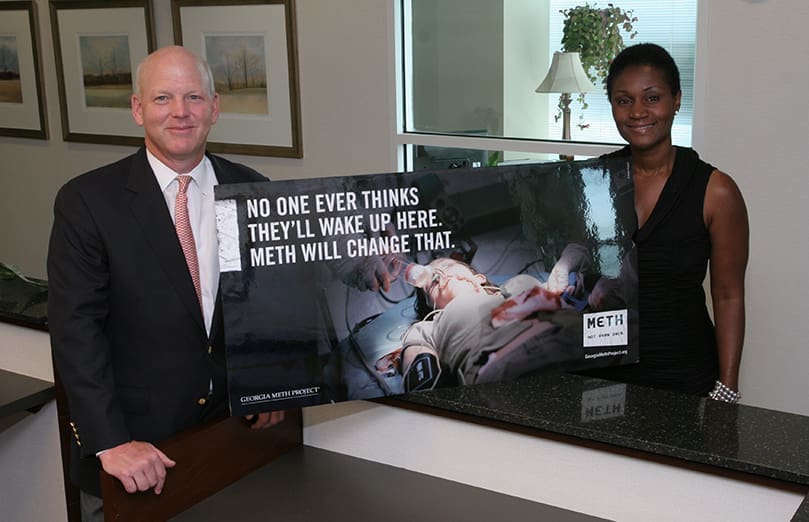 Photo By Michael Alexander
Photo By Michael AlexanderAtlanta
Meth Project Strips Glamour Off ‘Toxic’ Drug
By ANDREW NELSON, Staff Writer | Published September 16, 2010
Lee Shaw’s day job is overseeing his private family asset management firm. But he has taken on another role as an anti-drug advocate.
“I didn’t know the difference between meth, crack cocaine and ecstasy,” said Shaw, sitting in his well-appointed office.
That was then. Now, Shaw is the chairman of the Georgia Meth Project, a nonprofit with a goal to roll back methamphetamine abuse in the state by relying on prime time, in-your-face public service announcements, websites and community outreach.
“This is a drug with no equal,” he said about methamphetamines, calling it a “toxic cocktail” made from the likes of brake fluid, lithium batteries, sulfuric acid and other chemicals.
A parishioner of Christ the King Cathedral, Shaw has been involved with the project since he got an invitation in 2008 to a meeting with state Attorney General Thurbert Baker, authorities from the Georgia Bureau of Investigation and other business leaders.
Officials report methamphetamine abuse costs Georgia $1.3 billion annually in health care, lost productivity, incarceration and foster care.
“It is absolutely destroying our state,” said Shaw.
Hearing how the drug devastates families and small towns persuaded him to get involved, Shaw said.
“It’s a nightmare. The big thing is saving families,” he said. “These are individuals and families that are struggling. You cannot even try it one time. The outcome is just a disaster.”
Meth Facts
According to the Centers for Disease Control, meth is a drug used by young adults, 18 to 25, followed by even younger teens, because it is often cheap. Many of its users are white and live in rural communities, but it is increasingly used by Latinos. Researchers have found young people use it for its energy boost and enhanced sexual libido.
In Georgia, Baker said meth is the state’s top crime problem. Georgia has the third highest number of meth users in the country, among 12- to 17-year-olds.
But other researchers report a leveling off, or even a drop in the number of meth users. According to the National Institute of Drug Abuse, in a 2009 survey the number of high school seniors reporting past-year use of meth was 1.2 percent, the lowest level since the question was first asked in 1999.
Some 14 percent of 10th-graders reported methamphetamine was easy to obtain, a drop from nearly 20 percent five years ago, according to the national institute.
Georgia Meth Project
State police and sheriffs talk about how the drug tears up communities in meetings with Georgia Meth Project staff in different counties, said Shaw, sipping coffee from a Catholic Charities mug.
“People don’t understand the risk. It is really something you cannot recover from. It’s just about a death penalty,” Shaw said.
The nonprofit project is relying on its 2010 survey to guide its strategy. It found 35 percent of Georgia teens see little or no risk in trying methamphetamine. One out of three 18- to 24-year-olds said it would be “very or somewhat easy” to get meth.
The Georgia Meth Project aims to change that. Since its launch in the spring, it’s saturated the airwaves, billboards, and online space with its high profile “Not Even Once” campaign. By the end of September, some 16,297 TV spots and 15,807 radio ads will have been logged throughout Georgia. The ads are shown during TV hits, like “American Idol,” “Grey’s Anatomy,” and “Community” to reach the target audience.
The TV ads feature actors with scabs and rotting teeth, robbing laundromats, selling themselves for sex and stealing to raise money for drugs. The print and billboard ads are also hard-hitting. For instance, one shows a filthy bathroom and the message, “No one thinks they’ll lose their virginity here. Meth will change that.”
“We’re showing the reality of using the drug. Those are real life stories,” Shaw said.
The 2010 survey will be reviewed every year to study the campaign’s impact. It is modeled on other anti-meth campaigns, such as a successful one in Montana. The state dropped from being in the top five in the nation in meth usage to 39th after its campaign. The goal of the Georgia Meth Project is to cut in half the number of first-time teen meth users.
The project aims to raise $18 million over three years to pay for this campaign. Nearly all of it comes from private donations and foundations.
For information visit www.georgiamethproject.org.